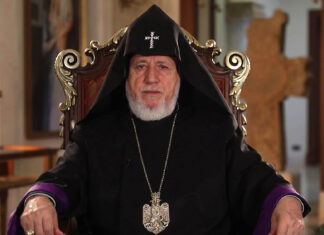YEREVAN (RFE/RL) — A leading Armenian political analyst believes that the establishment of democracy in Belarus will be of high significance to Armenia, a member of the Russian-led Eurasian Economic Union and Collective Security Treaty Organization that also include Belarus.
In an interview with RFE/RL’s Armenian Service (Azatutyun) on August 17 Richard Giragosian, the founding director of the Yerevan-based Regional Studies Center, said that in that case Armenia where a democratic change of government took place in 2018 will no longer feel “alone” in the post-Soviet groupings.
Giragosian thinks that the resignation of Belarusian President Alexander Lukashenko is only a matter of time. “It’s a question of days and even hours of what time he has left. But I don’t think the question is if, but [I think it’s] when he will leave power,” the political analyst said.
Hundreds of thousands of protesters have been filling the streets of capital Minsk and other Belarusian cities protesting the official results of the August 9 presidential election that they believe have been rigged in favor of Lukashenko who has ruled Belarus since 1994.
Many observers in Yerevan have been drawing parallels between the unfolding events in Belarus and Armenia’s peaceful protests in 2018 that led to the resignation of Serzh Sargsyan, who attempted to extend his rule after completing two five-year presidential terms.
“In a general sense like Armenia’s 2018 Velvet Revolution the movement in Belarus is everything except geopolitical. This is not about the European Union, it’s not about Russia or the West. It’s about a change of government in Belarus like in Armenia,” Giragosian said. “One key difference in what makes Belarus very different from Armenia is that in 2018 former President Serzh Sargsyan in many ways realized that his time had run out. And to his credit, he did not go out fighting. Lukashenko wants to go out with a battle.”








